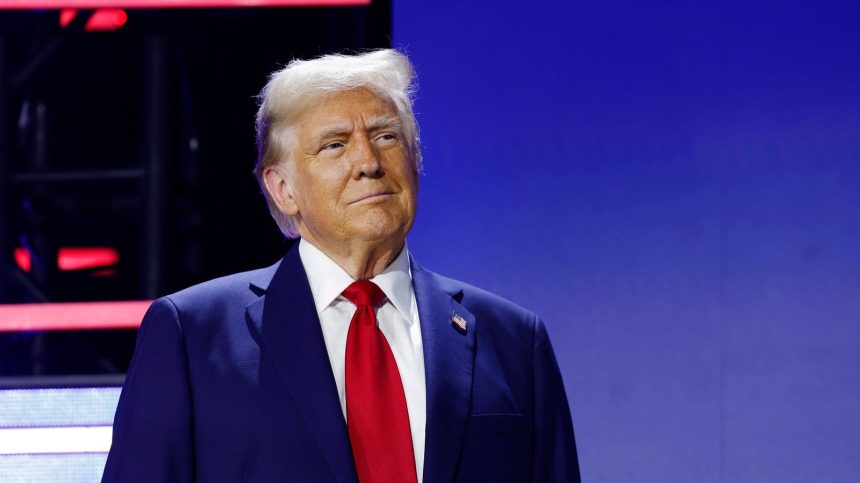The Resignation of Justin Trudeau and Donald Trump’s Vision of a North American Merger
The political landscape of North America experienced a seismic shift with the announcement of Canadian Prime Minister Justin Trudeau’s resignation, a decision that reverberated across the continent and drew a provocative response from former US President Donald Trump. Trudeau’s departure, fueled by internal party struggles and mounting pressure, opened the door for renewed discussions about the future of US-Canada relations, with Trump reigniting his long-standing jest about Canada becoming the 51st state. This seemingly playful jab, however, underscores deeper tensions and Trump’s enduring focus on trade imbalances and perceived vulnerabilities in North American security.
Trudeau’s resignation, announced in a press conference, marked the end of an era for the Liberal Party, which he had led for over a decade. Citing internal battles and a desire to allow the party to move forward under new leadership, Trudeau’s decision came after increasing speculation and growing calls for his departure. The timing of the announcement, following the holiday season, allowed for a period of reflection and paved the way for a leadership transition within the Liberal Party. While Trudeau acknowledged the challenges faced during his tenure, he emphasized his commitment to the party and its future.
Trump’s reaction to Trudeau’s resignation was swift and characteristically provocative. Resurrecting his playful yet pointed nickname for Trudeau, "Governor Justin Trudeau," and referring to Canada as the "51st State," Trump suggested that Trudeau’s resignation was a tacit acknowledgment of Canada’s economic dependence on the United States. This jab, rooted in Trump’s ongoing concerns about trade deficits and subsidies, reflects his broader "America First" philosophy and his belief that other nations, including Canada, benefit unfairly from trade agreements with the US.
Trump’s vision of a North American merger, while presented with a dose of humor, also tapped into his recurring anxieties about national security, particularly with regard to perceived threats from China and Russia. By suggesting that a unified North America would be "TOTALLY SECURE" from these potential adversaries, Trump reinforced his nationalistic rhetoric and highlighted his concern about the vulnerability of both the US and Canada to external forces. This rhetoric echoes his previous statements about securing US interests through territorial expansion, as evidenced by his remarks about Greenland and the Panama Canal.
The underlying tension between Trump’s jesting remarks and the serious implications of his proposed policies underscores the complexities of the US-Canada relationship. While the idea of Canada becoming the 51st state remains largely in the realm of political satire, it serves as a reminder of the historical and ongoing debates about economic interdependence, national identity, and security cooperation between the two nations. Trump’s focus on trade imbalances and his desire to renegotiate trade agreements have been consistent themes throughout his political career, reflecting his belief that the US has been disadvantaged by existing trade arrangements.
The prospect of a unified North America, however unlikely, raises fundamental questions about sovereignty, governance, and cultural identity. While proponents might argue that such a union could enhance economic prosperity and security cooperation, critics would likely raise concerns about the loss of national identity, the potential erosion of democratic institutions, and the challenges of integrating two distinct political and cultural systems. The historical context of US-Canada relations, marked by both cooperation and competition, further complicates the notion of a seamless merger.
Trump’s consistent focus on trade imbalances and his penchant for provocative rhetoric have undoubtedly contributed to a reassessment of the US-Canada relationship. While both nations share a long history of cooperation and mutual benefit, Trump’s approach has challenged the traditional norms of diplomatic discourse and raised questions about the future direction of bilateral relations. The resignation of Justin Trudeau, a figure who often found himself at odds with Trump’s policies, may signal a potential shift in the dynamics between the two countries.
The evolving political landscape in both the US and Canada will undoubtedly shape the trajectory of their future relationship. As new leaders emerge and political priorities shift, the ongoing dialogue about trade, security, and national identity will continue to influence the interactions between these two North American neighbors. Whether Trump’s vision of a unified continent ever moves beyond the realm of political theater remains to be seen, but his remarks serve as a potent reminder of the complex and sometimes contentious dynamics that characterize the US-Canada relationship. The departure of Trudeau from the political stage may herald a new chapter in this ongoing saga, one that will require careful navigation and a willingness to address the underlying issues that shape the future of North America.



